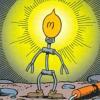Experience of weiiskruez would help him be better as process engineer, if this happens in the future. Yet Chemical Engineering is not limited to Process. There are a lot of other activities that could also be interesting and rewarding. Research and Development as well as Process Design had the fame of well payed activities and education seems closer to them. Plant Operation came next. But demand of them depends on local conditions and economy. In Greece for instance, these activities are now very limited to old and new engineers searching for a job. It is no use waiting for a seat there, better to search for e.g. project engineering, commissioning, inspection, technical sales, teaching, investment evaluation, insurance studies, sales representation, just to name few activities that colleagues have successfully dealt with. They have succeeded even in more "irrelevant" jobs, like keeping small shops, banking, book publishing, stock exchange management, building enterprise, sale representatives. Engineering education seem to offer versatility and a systematic thinking of treating data and finding ways out. This is a reason for optimism in times of general adversity.
Nevertheless "irrelevant" and other non technical activities (e.g. those reported after teaching) reduce future perspective of dealing with process design, project engineering, etc. If you stick to an "unorthodox" activity for years, you had better like it, it is not easy to change road then. It does not mean poor road anyway.
The employment through "networks" is a source of great injustice, as I see it here; the "networks" are in force even after employment, spreading favoritism. Responsible work is not encouraged, ignorant people are promoted in detriment of society. In a later stage (after years) the organization survives through its connection to "networks". 'Networks' elimination is verbally supported by anybody, yet a few of us really mean it. Change of mentality needs long time.
"How well you sell yourself" is rightly expressed in post no 8, meaning qualifications after years of effective work. Excessive "selling yourself" in the working environment can place neighboring colleagues into shadow. Such attempts have been seen, rarely indeed. AICH code of ethics (CE) clarifies that Engineers shall "build their professional reputations on the merits of their services"<http://www.aiche.org/about/code-ethics>. I think this also addresses coaxing, another treacherous tool. Engineers shall also be "honest and impartial.."(CE).
Chemical Engineers shall take care of "the safety, health, and welfare of the public and protect the environment in the performance of their professional duties" (CE). They are not just employees and cannot delegate ethical responsibility to anyone else (*). It is not only a job for living, one could enhance it to a profession for general rather than individual benefit.
On the other hand almost anybody needs money, the two trends have to be realistically combined. A "healthy" working environment with less money can be better than another with more. The question is what priority money has in the mind of young engineer, who should have a ready answer (without prejudice) before applying for a job; and be willing to change job, if this does not meet expectations. This is a respected personal right, not bad if decently done. Find the right kind of job for you early, mobility will be less and less as age advances.
Competition has ethics and rules. I think engineering is not so important to clients now, as it was (say) 30 years ago; why pay (say) 10% of work budget for engineering? This belief has lowered income of Engineering Companies. A colleague used to say (evidently in exaggeration) that local electrical stations could be made at half their budget price, if quality were sacrificed to tolerable levels (=less engineering).
A good prosperous work seat, according to our initial thoughts, may be a matter of good luck. A good work environment, encouraging initiation, cooperation and respecting our principles, can be worth of less money. This may be apparent as career approaches the end, but it concerns choices of the past.
(*) G. Ulrich, P. Vasudevan, "Chemical Engineering, Process Design and economics", Process Publishing (2004), Chapter 9 - Ethics and Professionalism.
Edited by kkala, 24 February 2013 - 06:43 PM.
![]() Oops, I think I reposted it right after Ankur posted a reply, cant see it...)
Oops, I think I reposted it right after Ankur posted a reply, cant see it...)
 FB
FB




















